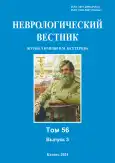Development and psychometric assessment of the test “Predictive style”
- Authors: Granitsa A.S.1, Lotfullina A.R.1, Perishivkina V.V.1
-
Affiliations:
- Kazan Federal University
- Issue: Vol LVI, No 3 (2024)
- Pages: 247-258
- Section: Original study arcticles
- URL: https://journal-vniispk.ru/1027-4898/article/view/270329
- DOI: https://doi.org/10.17816/nb630139
- ID: 270329
Cite item
Abstract
BACKGROUND: Prognostic processes are an important link in adaptation to stressful events and resilience. The role of the features of prognostic abilities in various mental disorders is shown. We introduce and substantiate a new psychological construct, the “Predictive style”, reflecting the subjective importance of the forecasting process and the tendency to assess the favorability of predicted events.
AIM: To develop and conduct a psychometric assessment of the “Predictive style” test.
MATERIALS AND METHODS: A “Predictive style” test was developed, including 21 statements divided into 4 scales: excessive optimism, excessive pessimism, excessive forecasting and indifference to forecasts. The development of the test included the study of the external and internal validity, as well as the reliability of the methodology.
RESULTS: The measures of compliance with the test model were at a sufficient level: CFI=0.927; TLI=0.917; SRMR=0.0538; RMSEA=0.0497 (95% CI 0.0403–0.0589) and were performed on a new sample. All items correlated with their scales at a sufficient level. The reliability of the scales was in an acceptable range: Kronbach α=0.851–0.630. Retest reliability was confirmed after 2 months. Convergent validity was demonstrated by correlations with levels of optimism, pessimism, anticipation, predictive ability and coping strategies. Statistically significant differences were found between the groups of patients with neurotic mental disorders and those without psychopathology. Multiple linear regression demonstrated that the test scales were statistically significant predictors of anxiety and depression symptoms in the study participants. The results obtained confirm the criteria validity of the test under development.
CONCLUSION: The developed test has sufficient psychometric indicators and can be used in subsequent studies.
Full Text
##article.viewOnOriginalSite##About the authors
Alexander S. Granitsa
Kazan Federal University
Author for correspondence.
Email: hebechblu@yandex.ru
ORCID iD: 0000-0002-0498-7397
SPIN-code: 4775-7844
MD, Cand. Sci. (Med.), Assoc. Prof., Depart. of Neurology with courses in Psychiatry, Clinical Psychology and Medical Genetics
Russian Federation, KazanAdelina R. Lotfullina
Kazan Federal University
Email: lotfullinaadelina2001@mail.ru
ORCID iD: 0009-0001-0510-9625
Student, Faculty of Medicine
Russian Federation, KazanVlada V. Perishivkina
Kazan Federal University
Email: vlada.pereshivkina@gmail.com
ORCID iD: 0009-0008-4366-7290
Student, Faculty of Medicine
Russian Federation, KazanReferences
- Mendelevich VD. Anticipatory mechanisms of neurogenesis. Kazan: Meditsina; 2011. 288 p. (In Russ.) EDN: QMCMUH
- Samsolenko LS. Content features of the development of prognostic abilities in psychology students. Research Result. Pedagogy and Psychology of Education. 2020;6(2):94–107. (In Russ.) EDN: EQBVGS doi: 10.18413/2313-8971-2020-6-2-0-9
- Nikitin DM. Methods and models of justification of managerial decisions and ways to improve the efficiency of managerial decisions. Science and Education Trend. 2019;(57–7):50–54. (In Russ.) EDN: TDJTEF doi: 10.18411/lj-12-2019-144
- Barrett LF. The theory of constructed emotion: An active inference account of interoception and categorization. J Urol. 2017;12(11):1833. doi: 10.1093/scan/nsw154
- Granitsa AS. Interrelations of intuition with anticipatory consistencies and psychological protections in patients with neurotic disorders. Neurology Bulletin. 2017;49(2):20–24. (In Russ.) EDN: YPILGF doi: 10.17816/nb14053
- Akhmetzyanova AI. Anticipative incompetence in conditions of disease and abnormal development (scientific attitude of the Kazan school). Practical Medicine. 2015;(5):42–45. (In Russ.) EDN: VCVFGT
- Ahmetzyanova AI. Structural-functional organization of anticipatively-prognostic mechanism of socially-psychological adaptation with addictive behavior. Psihologicheskie Issledovaniya. 2018;11(57):4. (In Russ.) EDN: YLPSOD doi: 10.54359/ps.v11i57.320
- Timuca DR. Comparative features of anticipatory consistency and the ability to predict in patients with neurotic and somatoform disorders. Practical Medicine. 2019;17(3):79–83. (In Russ.) EDN: VCXTIZ doi: 10.54359/ps.v11i57.320
- Kryukova TL, Kuftyak EV. Questionnaire of coping methods (adaptation of WCQ methodology). Journal of Practical Psychologist. 2007;(3):93–112. (In Russ.) EDN: YGCFYX
- Kornilova TV. Melbourne decision making questionnaire: a russian adaptation. Psikhologicheskie Issledovaniya. 2013;6(31):4. (In Russ.) EDN: SFJMLT doi: 10.54359/ps.v6i31.671
- Baturin NA, Mel'nikova NN. Technology of test development: part iv. Bulletin of the South Ural State University. Series: psychology. 2010;(40):13–28. (In Russ.) EDN: NYGEOD
- Shepperd JA, Pogge G, Howell JL. Assessing the consequences of unrealistic optimism: Challenges and recommendations. Conscious Cogn. 2017;50:69–78. doi: 10.1016/j.concog.2016.07.004
- Banshchikova TN, Sokolovskij ML, Morosanova VI. Strategic Approach to coping scale: Psychometric characteristics of the Russian version of technique. Siberian Journal of Psychology. 2020;(76):55–77. (In Russ.) EDN: ZXPVKL doi: 10.17223/17267080/76/4
- Regush LA. Empirical predictions — one of the characteristics of adult cognitive development. In: Horizons of maturity. Collection of scientific articles / Edited by Obukhova LF, Shapovalenko IV, Odintsova MA. Moscow: Moscow City Psychological and Pedagogical University; 2015. р. 78–82. (In Russ.) EDN: VERFNT
- Khanin YL. The Marlow-Crown scale for the study of approval motivation. Methodical letter. Leningrad: Research Institute of Physical Culture;1976. 10 p. (In Russ.)
- Gordeeva TO, Cychev OA, Osin EN. Diagnostics of dispositional optimism: validity and reliability of russian version of LOT-R. Psychology. Journal of Higher School of Economics. 2021;18(1):34–55. (In Russ.) EDN: QDVGRU doi: 10.17323/1813-8918-2021-1-34-55
- Abitov IR. Peculiarities of coping with stress by healthy persons and patients with psychosomatic and neurotic disorders. Psikhologicheskii Zhurnal. 2013;34(1):86–96. (In Russ.) EDN: PUZOHX
- Public organization "Russian Society of Psychiatrists". Anxiety-phobic disorders in adults. Clinical recommendations. 2021. 86 р. Available from: https://medi.ru/klinicheskie-rekomendatsii/trevozhno-fobicheskie-rasstrojstva-u-vzroslykh_14300/ Accessed: Mar 28, 2024. (In Russ.)
- Rybakova TG, Balashova TN. Clinical and psychological characteristics and diagnosis of affective disorders in alcoholism. Methodological recommendations. Leningrad: Leningrad Research Psychoneurological Institute 1988. 25 р. (In Russ.)
Supplementary files










